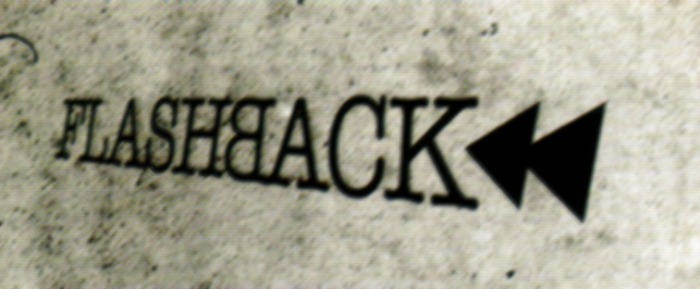When you had to write in school, you were probably placed under certain all-encompassing bans. “Never use the first-person” is a perennial favorite among teachers. I once had a respected professor who instructed students not to use semicolons. Now, the semicolon is a perfectly legitimate punctuation mark and has been put to many venerable uses. I believe my old professor banned it because so many people were prone to use it badly it was better that no one use it at all.
Many of the “Nevers” in writing are drawn up along a similar principle: Almost nobody does it right, so nobody should do it. Adjectives are an oft-targeted victim of this kind of reasoning. Another technique vulnerable to it is flashbacks, our topic of the day. Flashbacks possess a special nature, generally inclined to be awkward. They are  written like narrative, but they are not narrative. Flashbacks disrupt the story, breaking up the flow and momentum of events to reprise old news. I have seen them done well, but I have also seen them done with extraordinary badness. Not all authors appreciate the nature or the purpose of the technique.
written like narrative, but they are not narrative. Flashbacks disrupt the story, breaking up the flow and momentum of events to reprise old news. I have seen them done well, but I have also seen them done with extraordinary badness. Not all authors appreciate the nature or the purpose of the technique.
Two rules may be applied to the use of flashbacks. First, flashbacks must be relevant. A good way to think of this is that flashbacks must be revelatory of the story and not of the characters. What ought to be revealed of your characters can be revealed through the narrative proper: through their present talk, actions, thoughts. You might have constructed an entirely fascinating backstory, but you are telling a different story. Your story is in the present. The past throws light on the present, but the present throws light on people. There is no need of flashbacks to tell us about your characters.
Once I read a sci-fi novel that made excellent use of flashbacks. Very brief chapters, sprinkled among the narrative and set apart by italics, gave snapshots of the past. But these snapshots were keys to the story. They explained the nature of the present struggle, put forward mystery, foreshadowed the final revelation of villainy. Like all good flashbacks, they were dedicated to the story.
The second rule is that flashbacks must be brief. Again, flashbacks break the flow of the story, and for that reason they must be employed sparingly. Even if the flashbacks are genuinely interesting, people will become frustrated and impatient if the story is continually interrupted for field trips to the past. Flashbacks can spice up a story, but they should never be a main ingredient. Neither are they, in prodigious measure, likely to be altogether relevant. In the rare event that a prodigious measure is necessary, it is possible that you are starting the story in the wrong place.
The things people warn you about when you write fiction can generally be done. They just have to be done carefully. Flashbacks have been used to great effect, and you should always feel free to use them yourself. Only remember that they break the narrative and so must be very relevant and always brief.










































Another helpful rule of thumb is: If the flashback contains important emotional content that you need the audience to empathize with, and can only get the audience to empathize with if you pull them through a visceral scene filled with sensory detail and action that helps the reader feel and understand the current emotions that the character is experiencing (/decisions she’s about to make), then the flashback is justified and even preferable to the alternative.
If the above is true, it’s totally possible to have a flashback that’s 6 pages long and perfectly preferable–it just has to tick a lot of boxes to get there.
Brief is definitely the rule re American books. Read a British book, and you might get a 50-pg flashback. It becomes a story within a story. I’m fine with that, but I do find it interesting how tastes/rules differ.
I agree, at least for the most part. Though there’s going to be times when longer flashbacks are probably ok. It seems like a lot of writing rules are made to be broken.
There’ve been lots of times when anime has used flashbacks in a way that’s very effective, so experimenting with ways to translate that to a written novel can be useful. Something I picked up from watching Fate Zero is the idea of having flashbacks take place at the beginning of a scene or chapter, which reduces the amount of transition needed, so long as the flashback is introduced with a few things that reference what time in the person’s life it takes place in.
Kiritsugu’s backstory, for instance, was separated off into two different episodes that could actually be fairly stand alone if need be. There were a lot of strategic aspects in where those episodes were placed in the anime(midway through the second/last season, when people would be interested in learning more about him) and after a very impactful scene(Kiritsugu destroys one of his opponents in a deceitful and heinous way, which gets him into an argument with Arthur. Kiritsugu’s bitterness really comes forth in this scene, which ends up drawing Arthur’s sympathy, causing her to basically say that only a former idealistic hero that’s been through hell would be as bitter as Kiritsugu. He scowls at her, indicating she hit a nerve.) If I recall correctly, the next two episodes are his backstory, showing exactly what hell he’d been through to become the person he is as an adult.
It’s nice that the anime simply cuts to the chase and directly shows us his childhood so WE can take that journey into his mind and understand, without compromising his personality. (Kiritsugu certainly isn’t going to pour his life’s story out to Arthur, so having him go on a diatribe about his past wouldn’t work very well).
One of the classic ways of doing backstory IS of course to just have a character start explaining his past to others, which is great as long as it isn’t too annoyingly contrived(though the audience is probably somewhat willing to forgive contrivance if the backstory is cool enough). Some stories use dreams to communicate backstory as well, which can be really fun.
I’ve gotten to experiment with some of these things in my Naruto fanfic lately. This chapter uses the idea of starting with the flashback, rather than trying to transition to one in the middle of a scene. One goal for me lately is to make the transitions in and out of flashbacks subtle enough that italics aren’t needed, so a little bit of that is in here too(the chapter starts when Haku is a little kid, then leads up to the time the rest of the story takes place in):
https://www.fanfiction.net/s/12948191/4/What-The-Winds-Bring
I used to get a lot of criticism in my writer’s group for using flashbacks. After a while, I realized the reason was because the people in it were not familiar with how to use them and how they are a part of good literature. We want uninterrupted story lines (because our primary reference is TV, not books). And, Jill’s remark is good. If you read British literature you will get lots of flashbacks, some of them very long. A wise critic once remarked that the British write like Jane Austen while American authors write like Ernest Hemingway. Both of those authors have their strengths. But flashbacks are absolutely necessary to a good story. We want action, high-speed chases, no description–in other words, we want our books and stories to resemble a TV show. If we write like this, our writing will be as shallow as a TV show and worse off, since the written word doesn’t have a sound track!